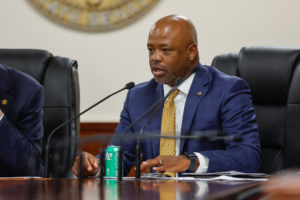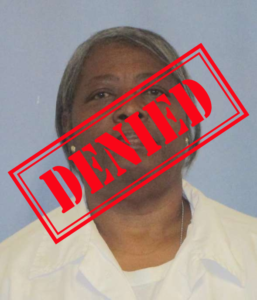PAROLE: Reforming Alabama’s Criminal Justice System

The 2024 session of the Alabama Legislature began last month, and early on there was renewed hope for meaningful criminal justice reform, spearheaded by Representative Chris England of Tuscaloosa. England’s proposed bills aim to address crucial issues plaguing the state’s justice system, from oversight of parole decisions to addressing flaws in the death penalty sentencing process.
One of England’s pivotal proposals, HB 30, seeks to establish a state council tasked with developing standards for the Board of Pardons and Paroles. This move comes in response to the alarming decline in parole grants, which have plummeted from 54% to a mere 7% in recent years. With overcrowded prisons and a system struggling to cope, oversight and accountability are urgently needed.

Rep. Chris England, D- , speaks during a committee meeting during a special session, Friday, July 21, 2023 in Montgomery, Ala. (Alabama Reflector Photo by Stew Milne)
The proposed Criminal Justice Policy Development Council would comprise diverse voices, including law enforcement personnel, elected officials, and community leaders. By establishing clear guidelines for parole decisions and providing avenues for appeals, HB 30 offers a pathway to fairer outcomes within the system.
Opposition to such reforms, as voiced by some Republican committee members, must be scrutinized. Concerns about government size should not overshadow the pressing need for reform, especially when lives and the well-being of communities are at stake. It’s imperative to move beyond political divisions and prioritize the well-being of all Alabamians.

Leola Harris, a dying woman facing End Stage Renal Disease (ESRD),Insulin Dependent Diabetes Mellitus (IDDM), Hypertension (HTN), AV Fistula and Dialysis was denied parole in January 2023.
Additionally, England’s proposed bills address flaws in the death penalty sentencing process. HB 27 offers a chance for resentencing for those whose sentences were overridden by judges, a critical step towards rectifying past injustices. Furthermore, requiring unanimous jury votes for death penalty imposition reflects a commitment to fairness and justice.
The consequences of flawed sentencing practices are stark, as evidenced by recent executions where jury verdicts were not unanimous. These cases underscore the urgent need for reform to ensure that justice is served equitably and transparently. Cases like that of Leola Harris, a dying woman, who we reported last year, was denied parole.
Public support for these reforms is palpable, with advocates from diverse backgrounds rallying behind calls for change. The international spotlight on Alabama’s death penalty issues underscores the importance of addressing these longstanding injustices.
As the 2024 legislative session goes on, Alabama has a unique opportunity to lead the way in criminal justice reform. By supporting Representative England’s bills, lawmakers can demonstrate a commitment to fairness, accountability, and redemption within the justice system. It’s time to seize this moment and enact reforms that reflect our shared values of justice and compassion.


